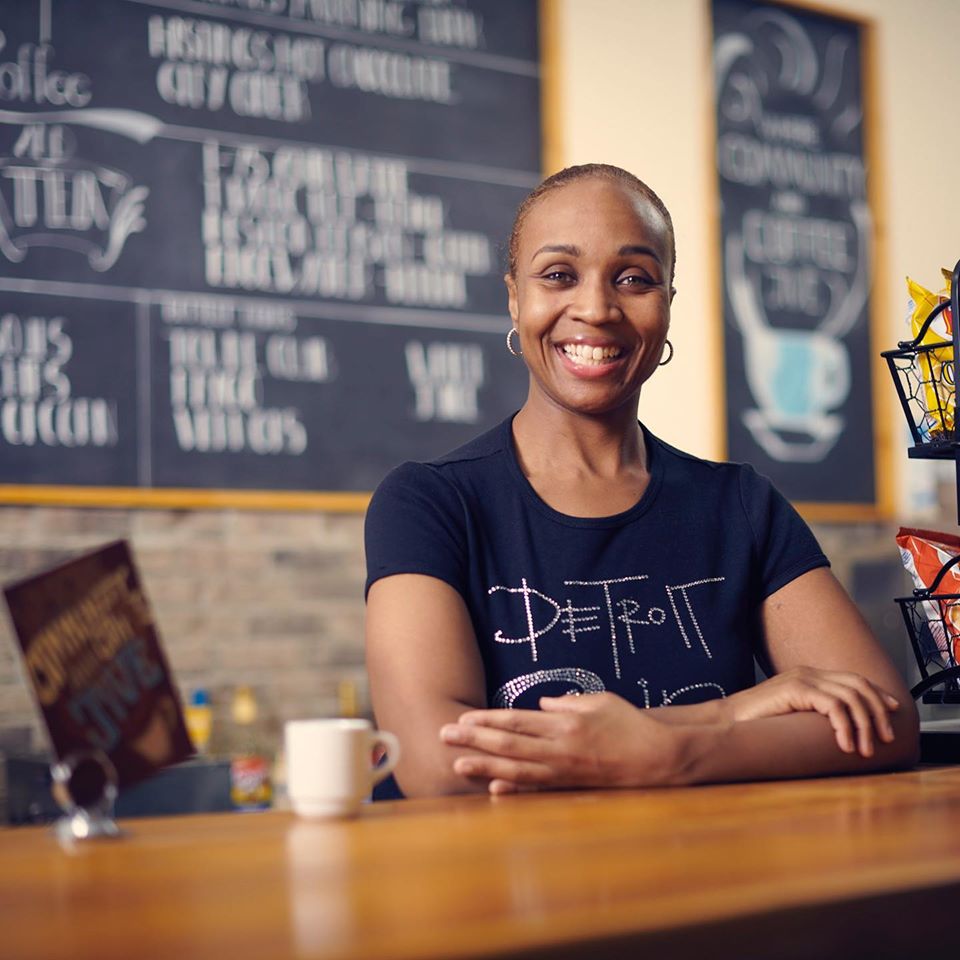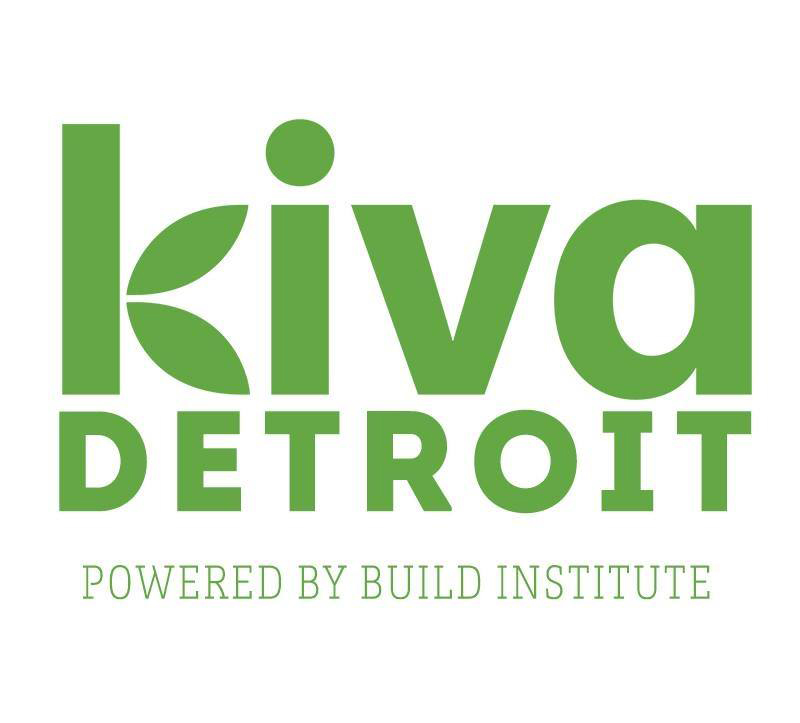As a law student at Michigan State University, Jevona Fudge Watson spent much of her free time working at a cafe near campus. Over the course of her studies, she fell in love with the coffee shop, and that adoration inspired her to open her own. But after graduating and becoming a prosecutor and a mother of two, Fudge Watson, now 43, didn’t think it was possible to tack entrepreneurship onto her busy schedule. In 2016, that changed. Fudge Watson started her entrepreneurial journey by opening Detroit Sip, a coffee shop located in the Bagley neighborhood in Detroit. As a social enterprise, Fudge Watson hosts small-business vendor markets and speakeasy talks with nonprofits such as Live6 on how to improve socio-economic conditions in Northwest Detroit and further community development.
It wasn’t just her busy schedule that originally discouraged Fudge Watson from opening a business, though. Black businesses typically face funding challenges not experienced by white entrepreneurs. Black-owned businesses launch with almost three times less overall capital than their white-owned counterparts, and regardless of their credit scores or net worth, their loan requests are three times less likely to be approved, according to a study by the Ewing Marion Kauffman Foundation. Seeking funding from private investors can be just as challenging; The Information, a digital publication that chronicles the tech industry, created an index of diversity in the venture capital industry in 2015, and according to the latest update, only 1% of 520 senior investment professionals identify as Black (as compared to the 73% white and the 24% Asian).

Jevona Fudge Watson switched from working as a prosecutor to pursuing community-based entrepreneurship. (Photo courtesy of Jevona Fudge Watson)
Since Black households possess just one-tenth of the wealth of a median white household, it also means they typically lack liquid capital, relying on personal finances to start a business. This funding gap also makes Black businesses vulnerable to financial events such as the one created by COVID-19, pushing many Black-owned businesses to the brink. In a recent study by the Federal Reserve Bank of New York, only 43% of Black-owned businesses earned the classification of “healthy” or “stable”.
However, Kiva, a micro-finance company with a similar platform to Kickstarter, connects small-loan lenders to low-income entrepreneurs and students in 77 countries. It also seeks to expand financial access to underserved communities and has served as a funding source for many Black entrepreneurs — particularly in Detroit. Evan Adams, manager of Capital Programs at the Build Institute and a Capital Access Manager for Kiva, says most entrepreneurs who come to the Kiva Detroit office are usually in need of only small amounts of money that they may not necessarily be eligible to get from a bank or are rejected from mainstream lenders. According to Adams, the maximum loan limit is around $15,000. Entrepreneurs who come to Kiva Detroit that otherwise get rejected are somewhere between 35% to 40% of Kiva’s business, according to Adams. Clients also come to Kiva because the paperwork process is less taxing and there is less collateral.
Kiva’s reasonable requirements and a streamlined application process are what brought Fudge Watson to Kiva Detroit, where she received a $10,000 loan. Socially Driven spoke with Fudge Watson about getting her business started with the help of Kiva and why social entrepreneurship is important to the Black community.
This interview and the questions posed have been edited for clarity.
Socially Driven: What made Kiva stand out in comparison to other loans?
Jevona Fudge Watson: Interest free, it’s character based, they don’t ask for collateral. So, those were all attractive things for me.
SD: Did you expect to have difficulty getting a loan? Were you concerned about being rejected from because of things like student debt?
JFW: So, before being introduced to Kiva, I was not even in the market for a loan. I actually turned down loans. I won $35,000 from [Motor City Match Grant], but also when you win the cash award, you are also approved for a matching amount in loans. So, if I participated in that part of the program, I would have been able to get, I think, $40,000 approved, in addition to getting a $35,000 grant. I didn’t want the loan because of the 8% interest rate, the fact that they would have had a lean on the building. I just wasn’t looking for that because I already felt stretched as thin as I could with creditors in terms of my mortgage [and] my student loans.
SD: Loans are historically more difficult for Black business owners to receive, which is why so many have begun using Kiva. What are your thoughts on that?
JFW: Many of us are first time business owners and may not have the knowledge of what they are looking for in advance. We may not have the same access to capital or collateral. For those of us that own our homes, I know I would not want to put my home up for collateral because it’s just not a risk I’m comfortable taking. So, I think that we don’t have the legacy points to go and put another business up for collateral. There are those of us that go to college and major in business and can come right out the gate and do those, but it’s just been my experience that those of us that have the training may not necessarily have the funds, and those of us who have the funds may not have the training. So, I think that has a huge impact. I think that there are a lot of times when minority businesses are located in urban areas, and I know that I have been privy to hearing that there were institutions that did not want to issue loans to certain neighborhoods — mine being one of them at one point in time. The pendulum has definitely switched now, but there were people who were not comfortable lending to that area before it became popular, so I think that’s also a deterrent.
SD: So why did you change your mind and approach Kiva?
JFW: The interest rate and again, I can’t say this enough, I was not in the market for a loan at all. I happened to be at a presentation for Build Institute because I went through their business course. They had a representative talk about [Kiva], and I’m like ‘This doesn’t sound right. This is too good to be true.’ I was very leery of it. So, I read about it and I met with them, and when I realized that it was really what they presented it to be, I immediately signed up. But, had it not been for me being in that network, [I wouldn’t have the loan]. That’s why I try to tell entrepreneurs, ‘You have to join some organizations, but you have to look at what they do and what resources they offer.’
SD: How do you think other entrepreneurs should prepare themselves when seeking to acquire a loan?
JFW: This is coming from the attorney side of me, you’ve got to know the terms. You really have to read over the fine print, and you really have to be realistic with yourself. Like, we all have this bright idea of how successful our business is going to be because it’s such a great idea and people are going to come because it’s new. That part is true, but you have to plan for it. You can’t take on more than you can chew. So, I think that’s an area that if that’s not your background, you have to enlist the help of some professionals, so that your financial projections are realistic [and] all of those things go through the right filters and the right professionals, so that you don’t set yourself up to default the loan because depending on the loans, you could lose a lot.
SD: Do you think entrepreneurship is essential for the Black community?
JFW: Absolutely. But if we have more of a variety of businesses because we do more than eat, we do more than drink. We need healthy grocery stores, we need healthy options, and dry cleaners. We need all those things. We could be in our communities and get all those essential things, and we would not have to leave our communities. So, I think it is more important than ever for us to be able to own our spaces, so that we can sustain them in times like this, and just write our own narrative instead of being reactionary, or just always being the consumer and never the producer.
SD: Do you think social entrepreneurship, like entrepreneurship in general, could be just as essential for the black community?
JFW: Absolutely, I couldn’t see myself owning a business without a social piece to it. I truly believe to whom much is given, much is required. I’m not set up that way. Michigan is one of the few states that offers it, but I don’t see it any other way. I don’t see any other way.
Featured image courtesy of Jevona Fudge Watson.



